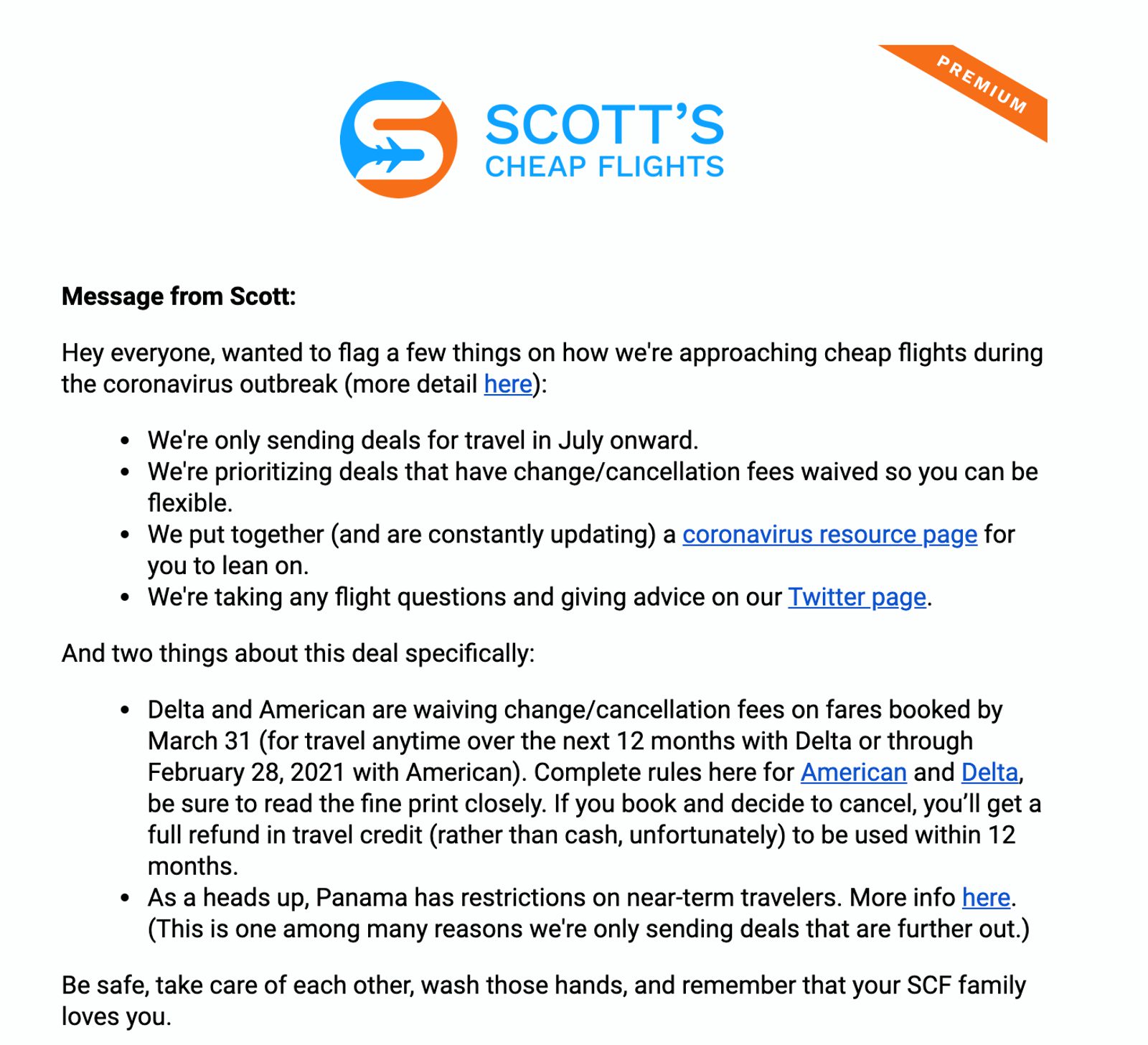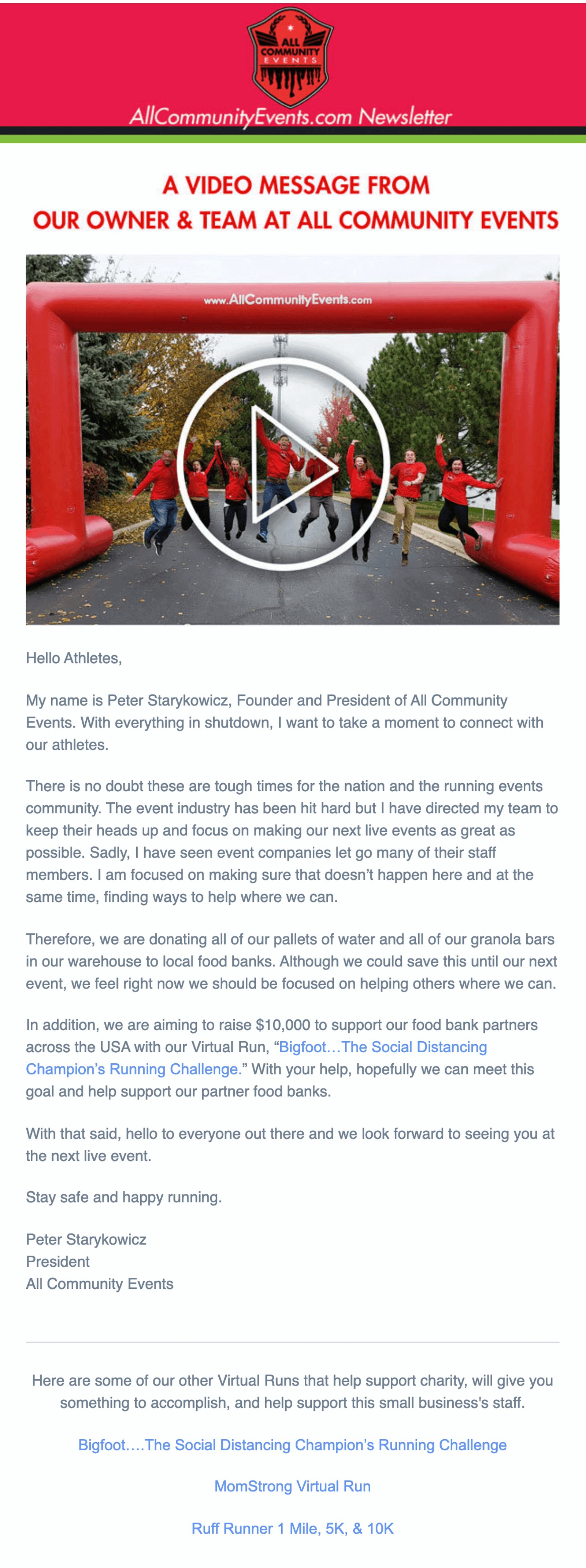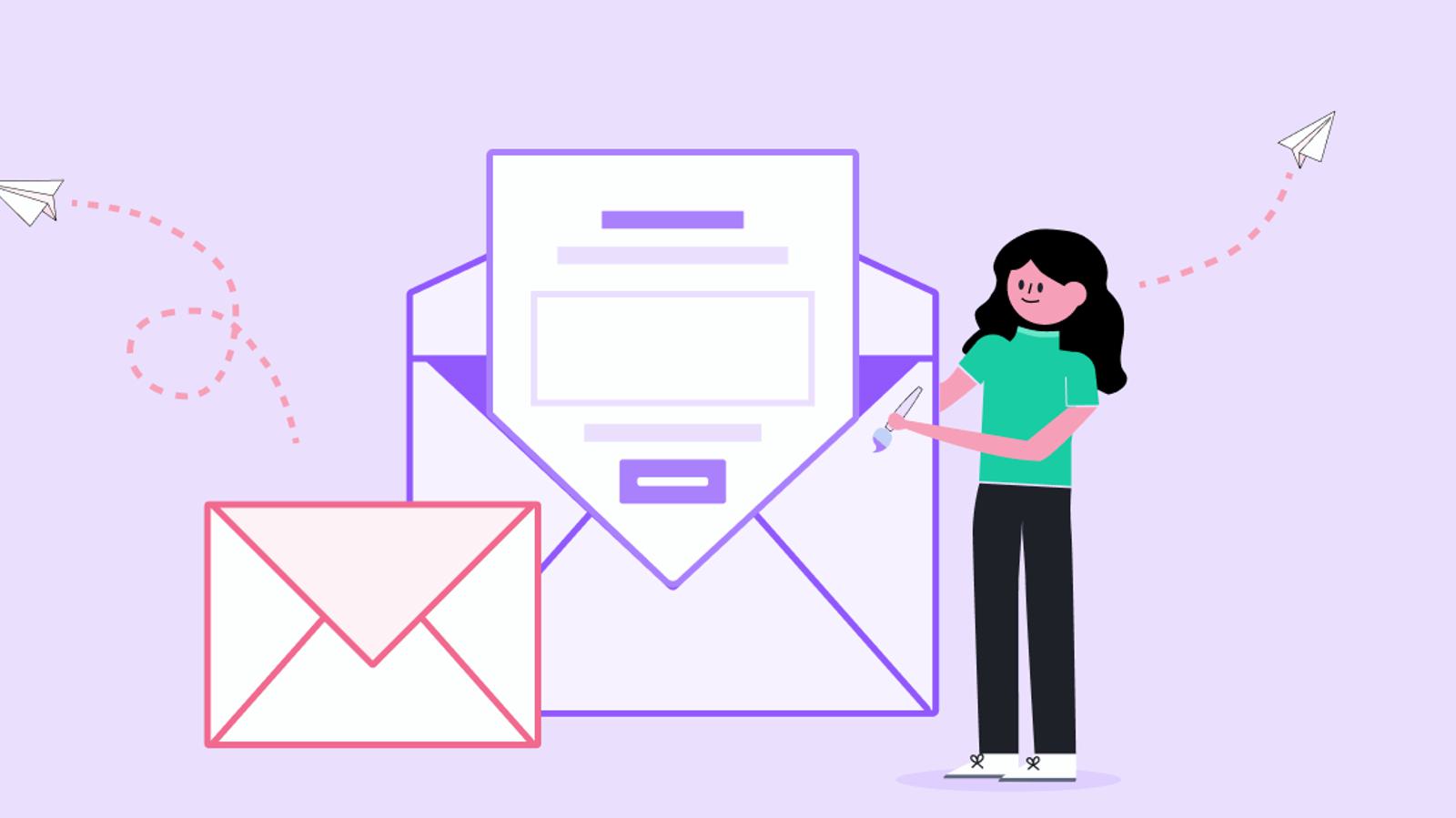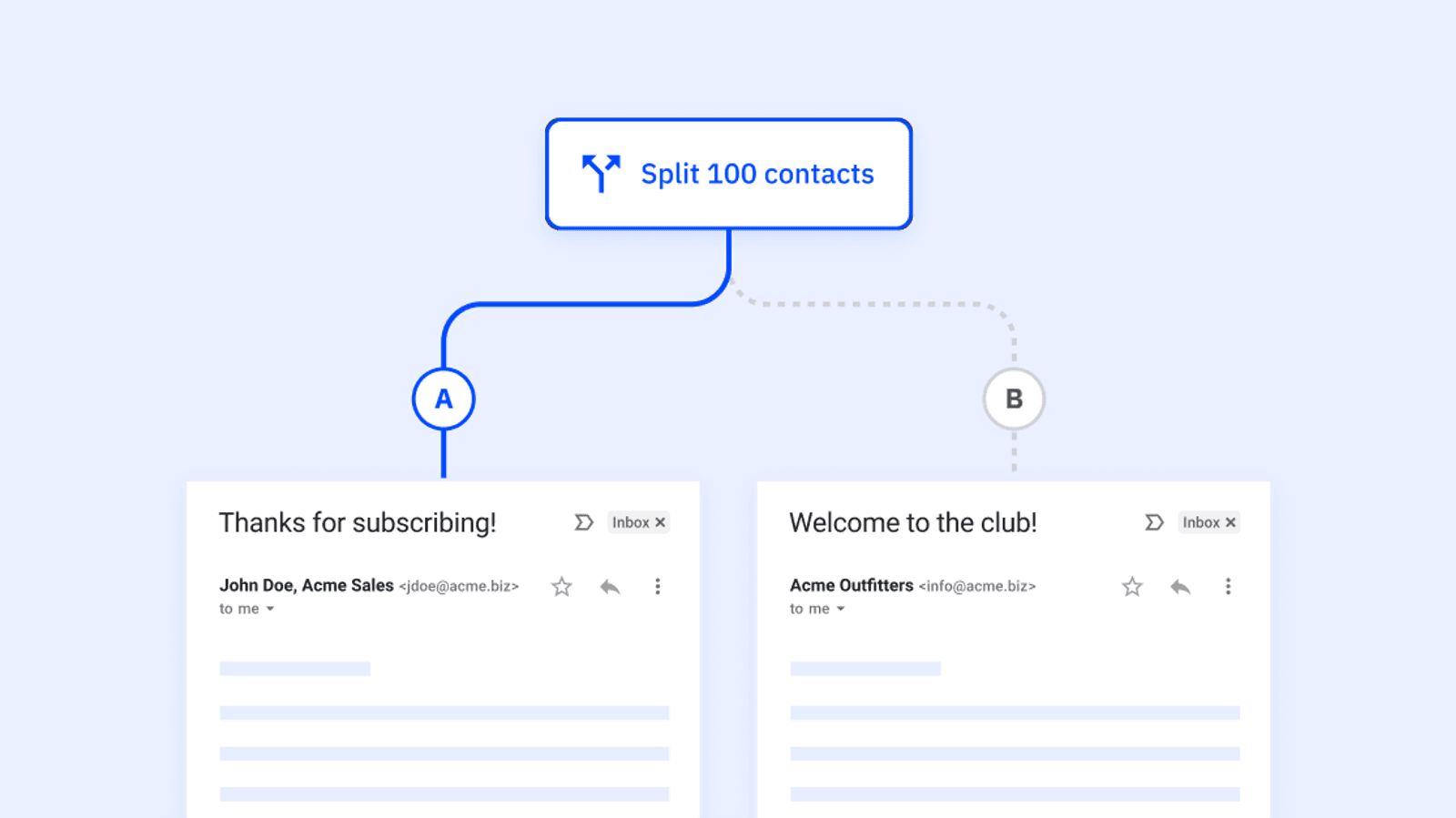What should you send to your customers right now?
- Now is not the time to stop talking to your customers — but it’s also really hard to know what to say
- You don’t want to act like nothing is wrong, but you also don’t want to be the 500th email of copy-pasted CDC guidelines that people receive today
- Your customers want to hear from you and support you — but you need to offer them empathy, humanity, and value in return
We could come up with a list of do’s and don'ts for email marketing in the age of COVID-19, but things are so uncertain and changing so fast — it’s hard to say that what works today will still work tomorrow, or a week from now.
Instead, here are some emails we’ve received during the COVID-19 crisis — and what we think they get right. Not every approach will be a good fit for your business, but you know your customers. You’ve got this.
12 COVID-19 email examples that get it right:
- Shifting from local events to community support (Do312)
- Sharing relevant expertise (Principal)
- Highlighting value (Aggregage)
- Offering hope (and actionable advice) (Joel Klettke)
- Adapting to changes in their industry (Scott’s Cheap Flights)
- Addressing common concerns with daily updates (Acorns)
- Acknowledging the situation without dwelling on it (Orbit Media)
- Supporting artists and the music industry (StubHub)
- Giving advice based on experience (Trello)
- Sending a message from leadership (All Community Events)
- Combining brick and mortar with online orders (Fleet Feet)
- Creating a newsletter to support employees (Lost Lake)
1. Shifting from local events to community support (Do312)

Subject line: Breweries & Distilleries Offering Contact-Free Pick-Up | Donated Meals For Service Industry Workers
What Do312 gets right: Do312’s website and newsletter highlight events and places in Chicago — which is hard to do when people have to stay home and venues are shut down. Do312 adapted their newsletter based on the current situation. They know their audience — people who love Chicago’s restaurant, bar, and music scenes — is looking for ways to help those industries and each other. This newsletter shares ways to support the community (along with some local humor and good news from the legendary Jeppson’s Malort).
2. Sharing relevant expertise (Principal)

Subject line: Things feel uncertain. We’re here to help.
What Principal gets right: Principal is an expert in the finance sector — but in this email, they present that expertise with humility. Instead of saying “we’ve got answers,” they say “here’s what we know” and acknowledge the uncertainty of the situation. Principal’s email also offers expert advice in multiple forms, including FAQs, a webinar, articles, and the ability to work with a financial professional. This makes it easier for clients to find the answers they’re looking for.
3. Highlighting value (Aggregage)

Subject line: How marketers are transitioning from live events
What Emily at Aggregage gets right: Even with everything going on, salespeople still need to sell. It’s harder (and more important) than ever to find the balance between empathy and humanity, and pushing a sale — Emily from Aggregage gets it right by sharing how their solution can help businesses facing a difficult decision, and how it’s working for current clients.
4. Offering hope (and actionable advice) (Joel Klettke)
Subject line: Good news for bad times
What Joel Klettke gets right: Joel’s email is full of opportunities for people to help one another and get the help they need. While he talks briefly about his own company (Case Study Buddy), he focuses mainly on sharing both valuable resources and actionable advice that his subscribers can use right away.
5. Adapting to changes in their industry (Scott’s Cheap Flights)

Subject line: Panama — $200s (RT) Jul - Sep
What Scott’s Cheap Flights gets right: Scott’s Cheap Flights (SCF) sends international flight deals to members — but travel is one of the industries hit hardest by the current crisis. The SCF team changed their email strategy; each deal email starts with the above message from Scott, and only highlight deals available for travel in July onward and focus on flights with flexible change or cancellation policies.
The SCF team also put together a coronavirus resources page with up-to-date information on travel restrictions and advisories.
6. Addressing common concerns with daily updates (Acorns)

Subject line: 03/24 - The markets, in a nutshell
What Acorns gets right: Acorns launched a new daily newsletter — “The markets, in a nutshell” — mid-March to address users’ concerns about the market and provide financial advice. As a micro-investing platform, Acorns is well-suited to give people this kind of advice.
7. Acknowledging the situation without dwelling on it (Orbit Media)

Subject line: This email has nothing to do with Covid-19
What Orbit Media gets right: The subject line is a great attention-grabber. It might not be well-received by every audience, but Andy Crestodina of Orbit Media knows his subscribers — and knows that people are already swamped in emails about COVID-19. He shares a quick update on his staff and business before jumping into Orbit’s usual newsletter content and list of upcoming (now-virtual) events.
8. Supporting artists and the music industry (StubHub)

Subject line: ???? LISTEN UP: Mood-lifting live streams ???? and how to support deserving artists
What StubHub gets right: With the cancellation of live events, the music industry is hurting right now. Ticketing platform StubHub knows that their audience is interested in supporting live music — so rather than staying silent, they highlight both “mood-lifting” live streams and organizations accepting donations to help the community.
9. Giving advice based on experience (Trello)

Subject line: Remote work advice from 10 top companies
What Trello gets right: Project-management platform Trello is a fully-remote company, which makes them a credible source of advice for people who are newly transitioning to remote work. They also share specific ways their platform can help companies shift to remote work and collaboration.
10. Sending a message from leadership (All Community Events)

Subject line: A Video Message From Our President
What All Community Events gets right: All Community Events is a Chicago-based events company that produces local fun runs and distance races — two things that have been put on hold during the COVID-19 lockdowns. Their message from the company’s president makes this email more personal. They also offer runners a way to help the community and keep running, with virtual races that support charities (and All Community Events’ staff).
11. Combining brick-and-mortar with online ordering (Fleet Feet)
Subject line: We're proud to offer contactless curbside pickup.
What Fleet Feet gets right: Chicago running store Fleet Feet highlights a new online ordering, curbside pickup process that complies with CDC guidelines. This keeps their brand top-of-mind in a respectful way — running and walking can still be a part of a healthy lifestyle, and Fleet Feet is dedicated to supporting that while keeping customers and employees safe.
They also don’t shy away from uncertainty: “The situation continues to change very quickly. This is our current plan of action based on the latest information we have, but our plans may change at any time. The one thing that won't change is that we will be running, walking, and doing our part to keep you fit through this time.”
12. Creating a newsletter to support employees (Lost Lake)

Subject line: Welcome to the Lost Lake Community Thread!
What Lost Lake gets right: Chicago tiki bar Lost Lake had to lay off its entire staff due to mandated bar and restaurant closures. To support employees, Lost Lake created the Lost Lake Community Thread, a newsletter that subscribers receive in exchange for a donation to Lost Lake staff. The newsletter is full of stories, recipes, and activities to bring joy and humor to a hard, uncertain time — and brings people together while we’re physically apart.
Conclusion: Send your customers the emails they need
The email newsletters in this article are just some of the ways that people and brands are reaching out to their contacts right now:
- Sharing opportunities to support each other
- Offering advice that they’re uniquely qualified to give
- Getting personal with stories and videos
- Acknowledging that what’s going on is uncertain — but we’re all going through it together
It’s hard to know what to say to your customers right now — but they need to hear from you. If you aren’t sure where to start, think about the last customer you spoke to:
- What would help them right now?
- What can you offer them — resources, advice, empathy, humor?
What your customers expect from you might change as the situation changes. But when you keep your customers’ needs top-of-mind, you give them the content they need right now — and show them that you care.






